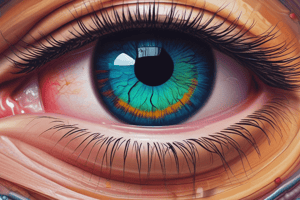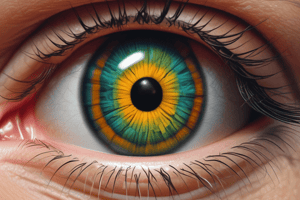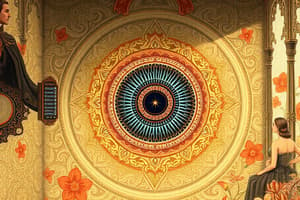Podcast
Questions and Answers
While performing an automated visual field test, your patient has 2 or more false negatives. The best course of action is:
While performing an automated visual field test, your patient has 2 or more false negatives. The best course of action is:
- Increase the stimulus size
- Make sure the fellow eye is patched properly
- Let the patient take a break (correct)
- Remind the patient to look only at the fixation light
As you are instructing a patient how to take an automated visual field test, the patient states they cannot see the fixation light. Your next step would be:
As you are instructing a patient how to take an automated visual field test, the patient states they cannot see the fixation light. Your next step would be:
- Increase the stimulus size
- Remove the patch from the fellow eye
- Change the fixation target to a diamond (correct)
- Tape the patient's upper eyelid
Which of the following instructions are important to tell patients when performing an automated visual field test?
Which of the following instructions are important to tell patients when performing an automated visual field test?
- Push the button when you see very bright lights
- Tell me when you see a light
- Be sure not to miss any lights
- Push the button when you see any light (correct)
- Do not blink during the test
A patient doesn't push the response button when a light is presented to him during an automated visual field test. This is an example of:
A patient doesn't push the response button when a light is presented to him during an automated visual field test. This is an example of:
A patient responds to light that is presented with a visual field machine has already determined his blind spot is. This is an example of:
A patient responds to light that is presented with a visual field machine has already determined his blind spot is. This is an example of:
A patient who is performing an automated visual field test has multiple fixation masses and false positives. This is likely due to:
A patient who is performing an automated visual field test has multiple fixation masses and false positives. This is likely due to:
If an automated visual field machine cannot locate the patient's blind spot the best course of action is to:
If an automated visual field machine cannot locate the patient's blind spot the best course of action is to:
When performing kinetic visual field testing, it's important to:
When performing kinetic visual field testing, it's important to:
The main difference between static and kinetic VFT is:
The main difference between static and kinetic VFT is:
Which of the following tests only the central 20º of visual field?
Which of the following tests only the central 20º of visual field?
When performing confrontation visual field testing it's important to define a visual field defect boundaries by vertical and horizontal marks because:
When performing confrontation visual field testing it's important to define a visual field defect boundaries by vertical and horizontal marks because:
Why is it important to patch or cover the fellow eye when performing VF testing?
Why is it important to patch or cover the fellow eye when performing VF testing?
Modifying Factors, Context, and Quality are all components of:
Modifying Factors, Context, and Quality are all components of:
A PT tells you he smokes cigarettes. Where would you enter this information?
A PT tells you he smokes cigarettes. Where would you enter this information?
You are eliciting a chief complaint from a patient who complains of a headache. Which of the following questions should you ask him?
You are eliciting a chief complaint from a patient who complains of a headache. Which of the following questions should you ask him?
While assessing the patient's pupil size in ambient lighting, you notice the pupils alternately become larger and smaller than larger again under study illumination. This is:
While assessing the patient's pupil size in ambient lighting, you notice the pupils alternately become larger and smaller than larger again under study illumination. This is:
Normal pupils:
Normal pupils:
The amount of contraction and radiation of a pupil depends on:
The amount of contraction and radiation of a pupil depends on:
Accommodation, Convergence, and Pupillary Constriction are evidence of:
Accommodation, Convergence, and Pupillary Constriction are evidence of:
An Afferent Pupillary Defect:
An Afferent Pupillary Defect:
APD can occur in:
APD can occur in:
Anisocoria without ptosis suggests:
Anisocoria without ptosis suggests:
IOL Master Keratometry:
IOL Master Keratometry:
K readings of 42.75/45.25 x 180 indicate:
K readings of 42.75/45.25 x 180 indicate:
With the Rule Astigmatism:
With the Rule Astigmatism:
Assuming the diameter remains unchanged, the smaller the BC, the:
Assuming the diameter remains unchanged, the smaller the BC, the:
If the radius of a contact lens is the same but the diameter is increased:
If the radius of a contact lens is the same but the diameter is increased:
A Toric contact lens has:
A Toric contact lens has:
An ultrasonic transducer measures:
An ultrasonic transducer measures:
Contact lens spherical aberration can be measured by:
Contact lens spherical aberration can be measured by:
All of the following are important for contact lens wearers except:
All of the following are important for contact lens wearers except:
You are working up a contact lens patient. Which of these questions is the most important to ask?
You are working up a contact lens patient. Which of these questions is the most important to ask?
Which of these components is a routine part of a CL work-up?
Which of these components is a routine part of a CL work-up?
Why is it important to assess CL centration and movement?
Why is it important to assess CL centration and movement?
A CL that is too tight will:
A CL that is too tight will:
The Taco Test should be performed:
The Taco Test should be performed:
The patient should look ___ when inserting a SCL:
The patient should look ___ when inserting a SCL:
How does a patient center a SCL after insertion?
How does a patient center a SCL after insertion?
The best way to remove a SCL is:
The best way to remove a SCL is:
A RGP lens:
A RGP lens:
The main goal of counseling a patient regarding CL care is to:
The main goal of counseling a patient regarding CL care is to:
What is the most important step in disinfecting CLs?
What is the most important step in disinfecting CLs?
An advantage of Multi Purpose Solution is:
An advantage of Multi Purpose Solution is:
Hydrogen Peroxide Disinfection System:
Hydrogen Peroxide Disinfection System:
Before beginning manual lensometry it's important to:
Before beginning manual lensometry it's important to:
Equipment made of metal, plastic, or vinyl should be cleaned by:
Equipment made of metal, plastic, or vinyl should be cleaned by:
To clean corrosion off of bulb contacts use:
To clean corrosion off of bulb contacts use:
What's the best way to grasp a bulb?
What's the best way to grasp a bulb?
To place the Snellen eye chart at the correct distance for a 10' chart you must:
To place the Snellen eye chart at the correct distance for a 10' chart you must:
What line on the Snellen chart is used to calibrate a projector?
What line on the Snellen chart is used to calibrate a projector?
Flashcards are hidden until you start studying
Study Notes
Automated Visual Field Testing
- False negatives during testing indicate patient fatigue; allowing a break is essential.
- If a patient cannot see the fixation light, changing its shape to a diamond may help.
- Patients should push the button upon seeing any light, as this maximizes test accuracy.
- Presenting a brighter light after an initial non-response tests the patient's threshold for visual detection.
- Fixation loss is identified when patients respond to lights presented within their known blindspot.
Factors Influencing Test Results
- Multiple fixation losses and false positives are often due to patient anxiety.
- If a machine fails to locate the blindspot, a complete review of testing protocols is needed.
- Kinetic visual field tests require moving stimuli from non-seeing to seeing areas for accurate results.
- Static and kinetic visual field testing differ in that one uses a stationary stimulus, while the other employs a moving one.
Various Types of Visual Field Tests
- The Amsler Grid assesses the central 20º of the visual field, useful for detecting macular issues.
- Confrontation visual field testing uses markers to analyze defect boundaries, aiding in ruling out neurological conditions.
Importance of Eye Coverage
- Covering the fellow eye during testing is crucial as visual fields overlap, potentially affecting test results.
Components in Medical History
- The History of Present Illness (HPI) includes Modifying Factors, Context, and Quality which are essential for determining current health issues.
- Social history includes lifestyle factors like smoking, which can affect ocular health.
Assessing Pupil Response
- Normal pupil response displays variance in size between ambient light and darkness.
- The Near Flex Triad consists of accommodation, convergence, and pupillary constriction, indicating a healthy response.
Anomaly Recognition
- An afferent pupillary defect (APD) may suggest a cranial nerve issue, detectable in cases of optic nerve disease.
- Anisocoria with no ptosis often indicates Adie's pupil, a benign condition.
Contact Lens Specifications
- Toric contact lenses feature scribe marks for orientation during fitting and assessment.
- Accurate keratometry readings reveal corneal astigmatism, which factors into lens design.
Wearing and Maintaining Contact Lenses
- Essential for comfort and corneal health is regular assessment of lens centration and movement.
- Proper disinfection techniques, including rubbing lenses with cleaner, prevent microbial growth.
Cleaning Equipment and Handling
- Use a soft cloth with minimal cleaning solution for maintaining metal, plastic, or vinyl instrument cleanliness.
- Employing an eraser can effectively remove corrosion from bulb contacts.
Vision Testing Protocols
- To ensure proper distance, a Snellen eye chart for 10 feet must be positioned to equalize distances for accuracy in screening.
Projector Calibration
- The 20/200 line on the Snellen chart serves as a standard for calibrating projectors for consistent visual acuity testing.
Studying That Suits You
Use AI to generate personalized quizzes and flashcards to suit your learning preferences.




